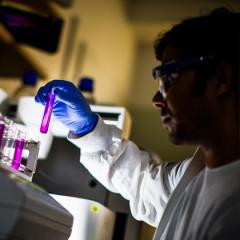 The University of Queensland’s Australian Institute for Bioengineering and Nanotechnology (AIBN) is pleased to announce that Professor Debra Bernhardt has been awarded the 2017 Association of Molecular Modellers of Australasia (AMMA) Medal.
The University of Queensland’s Australian Institute for Bioengineering and Nanotechnology (AIBN) is pleased to announce that Professor Debra Bernhardt has been awarded the 2017 Association of Molecular Modellers of Australasia (AMMA) Medal.
The AMMA is a representative body of the molecular modelling community of Australia and the Pacific basin. The organisation comprises molecular modellers, theoretical and computational chemists, cheminformaticians and others whose work relates to the simulation of molecular structure, dynamics and properties.
Professor Bernhardt said that it was an honour to receive the award, and a pleasant surprise, too. She is the fourth recipient of the medal, which was presented to her at the 2017 AMMA conference in Margaret River, Western Australia.
Her research has had significant impact on the field of molecular modelling.
“Some of the work we’re best known for is being able to derive the second law of thermodynamics from statistical mechanics,” said Prof Bernhardt.
The second law of thermodynamics says that entropy, or disorder, will always increase. Showing that this can be proved mathematically was a remarkable achievement, and improved our understanding of the link between statistics and thermodynamics.
Among other things, this has had significant advantages for molecular modelling, which is primarily concerned with making accurate predictions about the thermodynamic behaviour of molecules.
“We found that you could apply this to small scale systems,” says Professor Bernhardt. “It means that when you are making molecular models you can predict a little bit about what will happen.”
After all, molecules aren’t static objects but are incredibly dynamic. So, being able to predict the most likely location of particular atoms in a chemical reaction, for example, can vastly improve our knowledge about how such reactions take place and can guide the design of new reactions.
Professor Bernhardt’s current research relates to the study of non-equilibrium systems, which also has applications in a wide range of fields.
“Non-equilibrium systems are anything where a change in the system occurs,” she says. “Most systems are non-equilibrium, so there’s a huge variety. If you have something at one temperature and it’s cooling down, that’s non-equilibrium.”
An equilibrium system, by contrast, sits there doing nothing so it’s relatively straightforward to predict what will happen. Non-equilibrium systems are far more interesting, says Professor Bernhardt, but their dynamics are much more complex and there is a lot we still don’t know about their behaviour. 
“We want to predict what these systems would do under different conditions.”
“One of the things we’ve been looking at is how ions flow in a battery as it’s being charged or discharged, or how the viscosity of a material changes as it’s being stirred. We’re trying to develop the methods to study these things.”
She and her colleagues want to see if they can predict what will happen if they change the properties of a carefully controlled system. This work has important implications for materials science.
“Someone might have a material that works really well, but they don’t know why. So we try to figure out why.”
It could help identify the best materials for use in a particular situation, and help in the design of new materials that would suit a specific purpose.
Professor Bernhardt is also eager to understand how other complex factors, like chaos, affect the properties of materials. Chaotic elements can profoundly influence very tangible outcomes, like how viscous a material is, or how well it transfers heat.
She is also investigating the role that quantum mechanics plays in these systems. This is exciting new ground that could improve the ability to make predict the behaviour of molecules, particularly in cases where materials are under stress from things like corrosion or even physical forces.
This ability to make predictions about the behaviour of non-equilibrium systems is also very important in molecular modelling, which often seeks to accurately visualise rapidly changing systems like chemical reactions and enzyme catalysis. An improved understanding of non-equilibrium dynamics will further advance the ability to accurately simulate such atomic-level phenomena.
In addition to the AMMA Medal, Professor Bernhardt’s scientific contributions have also been recognised by the Australian Research Council (ARC) via recent invitation to join the ARC College of Experts. There are currently 176 members of the College who play a role in identifying research excellence in Australia and making recommendations for funding. Professor Bernhardt welcomes the opportunity to contribute to this important process.
Media: communications@aibn.uq.edu.au; Professor Debra Bernhardt d.bernhardt@uq.edu.au +61 7 334 63939


